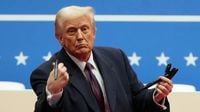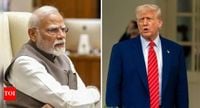As tensions between India and Pakistan escalate, U.S. President Donald Trump is urging both nations to de-escalate the conflict swiftly. In a press briefing on Friday, White House Press Secretary Karoline Leavitt emphasized the President's desire for a quick resolution, stating, "The President has expressed he wants to see this de-escalate as quickly as possible. He understands these two countries have been at odds with one another for decades, long before President Trump was here at the Oval Office."
Leavitt noted that Secretary of State Marco Rubio, who also serves as the National Security Advisor, has been actively involved in discussions with leaders from both nations to help bring the conflict to an end. She stated, "Secretary of State Marco Rubio has been in constant communication with the leaders of both countries, trying to bring this conflict to an end." This comes amid rising military action following India's recent strike on nine terror sites in Pakistan and Pakistan-occupied Kashmir (PoK) under 'Operation Sindoor', a response to the devastating Pahalgam massacre on April 22, where 26 individuals, primarily tourists, lost their lives.
On Thursday, May 8, 2025, Vice President JD Vance made it clear during an interview with Fox News that the U.S. would not intervene militarily in the conflict, stating, "What we can do is try to encourage these folks to de-escalate a little bit, but we're not going to get involved in the middle of a war that's fundamentally none of our business and has nothing to do with America's ability to control it." Vance's comments reflect a broader strategy of the Trump administration to allow India to manage its regional affairs without U.S. interference.
Despite the U.S. administration's efforts to encourage de-escalation, tensions remain high. Following India's military action on May 7, Pakistani forces attempted to retaliate against military installations in Jammu, Pathankot, Udhampur, and other locations. However, Indian forces successfully neutralized these attempts, further escalating the conflict. External Affairs Minister S. Jaishankar conveyed to Rubio during their separate discussions that India is prepared to respond firmly to any escalatory actions from Pakistan.
In the wake of these developments, the Modi government has reiterated its stance against any foreign intervention in its military operations against Pakistan. The Indian leadership has expressed its determination to take punitive measures following the attacks on its military facilities, asserting that it will not tolerate further aggression.
On the diplomatic front, Secretary of State Rubio emphasized the importance of Pakistan taking concrete steps to end its support for terrorist groups, which has been a longstanding point of contention in U.S.-Pakistan relations. During his recent calls with Jaishankar and Pakistani Prime Minister Shehbaz Sharif, Rubio reiterated the need for both nations to prioritize de-escalation.
Trump's administration appears to be walking a fine line, advocating for peace while simultaneously allowing India the freedom to act as it sees fit in a region often characterized by its volatility. The U.S. has historically viewed the India-Pakistan conflict as a potential nuclear flashpoint, and the administration's reluctance to intervene signals a shift from previous administrations that often sought to mediate directly.
As the situation develops, the U.S. continues to monitor the conflict closely, with officials expressing concerns about the potential for escalation into a broader regional war. Vice President Vance expressed hope that the situation would not spiral into a nuclear conflict, stating, "Our hope and our expectation is that this is not going to spiral into a broader regional war or, God forbid, a nuclear conflict. Right now, we don’t think that’s going to happen."
The current state of affairs highlights the complexities of U.S. foreign policy in South Asia, where balancing diplomatic relations with both India and Pakistan remains a challenging endeavor. As both nations navigate their historical grievances, the U.S. finds itself in a position of encouraging dialogue without overstepping its bounds.
In summary, the Trump administration's approach to the India-Pakistan conflict reflects a broader trend of non-intervention in foreign wars, coupled with a desire to maintain good relations with both countries. With military actions intensifying, the emphasis on diplomacy and de-escalation will be crucial in the coming days as leaders from both nations weigh their next steps.





